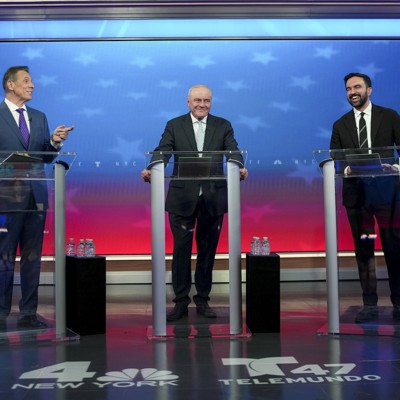Here we are again. Less than a week after the three leading candidates in New York City’s mayoral race took the stage for the first official debate in the general election, Zohran Mamdani, Andrew Cuomo and Curtis Sliwa will once again make their pitch to voters on Wednesday. But in the highly scrutinized race, flooded with personal attacks and differing visions for the city, will the upcoming debate offer voters any new information about the candidates?
Since the first debate, Republican nominee Sliwa has faced mounting pressure to drop out to give independent candidate Cuomo a chance to beat Democratic nominee Mamdani. Influential voices including Trump ally John Catsimatidis and the editorial boards of the New York Post and the Daily News have called on him to do so. But Sliwa’s determination, as well as his unorthodox performance in the first debate, has simultaneously led him to gain a new slate of online fans who are drawn to his authentic, populist approach.
“People who know nothing about politics suggest that everybody who’s going to vote for me is suddenly going to be reborn: We love Andrew Cuomo,” Sliwa said in a viral interview clip this week, slamming Bill Ackman’s calls for him to drop out in order to secure more votes for Cuomo. Mamdani shared the video of that exchange on X, calling it “genuinely positive for our democracy.”
A new poll appeared to affirm the calls for consolidation among the anti-Mamdani set. Released Monday by AARP New York and Gotham polling, it found that if Sliwa dropped out Cuomo and Mamdani would be in a much tighter race, with 44.6% of New Yorkers voting for Mamdani and 40.7% backing Cuomo. Currently, Mamdani maintains a double-digit lead over Cuomo.
Beth Finkel, AARP’s New York state director, told City & State that the candidates must make their pitch to older, undecided voters during Wednesday’s debate. “What the 50+ are thinking, what’s important to them is really important for the candidates to be addressing right now while these undecideds are still trying to make up their mind,” Finkel said.
For his part, Cuomo told reporters on Tuesday that voters should expect “no dramatic changes,” from last week’s debate, saying he was “pleased” with his performance. But he argued that more important than debate performances is having “a plan that makes sense.”
“Does it make sense to defund the police? Does it make sense to legalize prostitution? And who has the ability to actually get the job done? My opponent has never had a real job,” Cuomo said, using the same line of attacks he will likely make against Mamdani on Wednesday.
In the near week since the debate, Cuomo attempted to find new ways to attack Mamdani, criticizing him for appearing with imam Siraj Wahhaj, a controversial New York religious leader. He also launched a campaign effort focused on South(east?) Asian voters.
Mamdani meanwhile hosted a “Cost of Living Classic” soccer tournament on Sunday, focusing in on his affordability pitch, and then began a series of press conferences with other elected officials focused on the basics of governing, from scaffolding to procurement. Mamdani’s team did not respond to questions from City & State about his reflections on the previous debate and preparation for the upcoming one.
Thursday’s two-hour debate was largely taken up by oft-repeated questions over Israel’s war in Gaza, and the two leading candidates exchanging attacks over who’s best fit to run the city. As Cuomo and Mamdani sparred, Sliwa stepped into the spotlight, offering punchy remarks that set him apart from the two other men on the stage. “Thank God I’m not a professional politician,” the longtime New York City character said.
A spokesperson for his campaign told City & State on Tuesday that “He’ll be ready tomorrow for the same reason he was ready last week: because he’s prepared to govern, not just perform.”
Wednesday’s debate is being hosted by Spectrum NY1, The City, and WNYC/Gothamist. It is held just days before early voting starts on Oct. 25, and the general election on Nov. 4.

